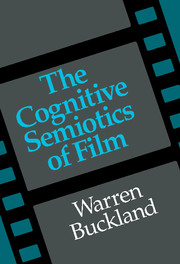Book contents
- Frontmatter
- Contents
- Preface and Acknowledgements
- 1 The Cognitive Turn in Film Theory
- 2 The Body on Screen and in Frame: Film and Cognitive Semantics
- 3 Not What Is Seen through the Window but the Window Itself: Reflexivity, Enunciation, and Film
- 4 The Institutional Context: A Semio-pragmatic Approach to Fiction and Documentary Film
- 5 All in the Mind? The Cognitive Status of Film Grammar
- Conclusion
- Notes
- Bibliography of Works Cited
- Index
1 - The Cognitive Turn in Film Theory
Published online by Cambridge University Press: 02 December 2009
- Frontmatter
- Contents
- Preface and Acknowledgements
- 1 The Cognitive Turn in Film Theory
- 2 The Body on Screen and in Frame: Film and Cognitive Semantics
- 3 Not What Is Seen through the Window but the Window Itself: Reflexivity, Enunciation, and Film
- 4 The Institutional Context: A Semio-pragmatic Approach to Fiction and Documentary Film
- 5 All in the Mind? The Cognitive Status of Film Grammar
- Conclusion
- Notes
- Bibliography of Works Cited
- Index
Summary
We have witnessed a number of attempts to by-pass [film theory's] most difficult conceptual problems by replacing it with something else. The “something else” is sometimes film history or aesthetics; sometimes it is a new object, such as television, popular culture, video; and sometimes it is a question of new methodologies, which may resemble dusted off methodologies from the social sciences, such as audience questionnaires or interviews, procedures that haven't benefitted from the literature in the social sciences that has interrogated its own methods and limitations.
(Janet Bergstrom)During the eighties, film studies gradually adopted ‘new’ methodologies from cultural studies and the social sciences, which displaced the speculative ideas of film theory. Rather than construct hypotheses and models about the general structure and spectators' experience of film, film studies has moved toward the ‘something else’ enumerated by Janet Bergstrom. However, a number of film scholars, in both Europe and North America, have persisted with film theory's most difficult conceptual problems, which they tackle from the perspective of cognitive science. This book is a report on the knowledge generated by these cognitive film theorists. But because this knowledge is fragmentary and incomplete, I have endeavored to expand and develop it in new and unforeseen ways.
However, for the most part, I do not report on the knowledge generated by the well-known cognitive film theorists in North America (David Bordwell, Noël Carroll, Edward Branigan, Joseph Anderson, among others) but discuss the much lesser known film theorists working in the cognitive tradition in Europe – particularly Francesco Casetti, Roger Odin, Michel Colin, and Dominique Chateau.
- Type
- Chapter
- Information
- The Cognitive Semiotics of Film , pp. 1 - 25Publisher: Cambridge University PressPrint publication year: 2000
- 1
- Cited by



